 Tassos Docs
Tassos Docs
-
- Adding an “Other” Option
- Adding a Unique ID to Each Form Submission
- Show or Hide Form Fields Based on User Joomla User Group
- Disabling Browser Autocomplete for Form Fields
- Scroll the Page to the Top When a Long Form is Submitted
- Display Submissions Count for a Specific Form
- Populate Drop Down, Radio Buttons or Checkboxes with a CSV File
- Automatically Delete Submissions Older Than X Days
- Silently POST Submitted Data to Any API or URL
- Automatically Save Each Submission to a JSON file
- Authenticate and Login a User with a Custom Joomla Form
- Auto-Populate a Form Field with an Article Data
- Add a placeholder text to a Dropdown
- Create Multilingual Forms in Joomla
- Create a custom Joomla User Registration Form
- Redirect User to a URL After Form Submission
- Importing and Exporting Forms
- Exporting Form Submissions
- Convert Forms
-
- How to Create a Quiz Form
- Displaying a Popup After Form Submission Using EngageBox
- Conditional Content Shortcode in Convert Forms
- Copy Value From One Field to Another
- Tasks
- Exporting Form Submissions with a Webhook URL
- Conditional Fields
- PDF Form Submissions
- Input Masks
- Field Calculations
- Auto-Populate Form Fields Using Query String
- Use Smart Tags
-
- Enable Minimum Time to Submit
- Restrict Form Submissions Based on IP
- Enforcing a Custom Password Policy in Convert Forms
- Add Cloudflare Turnstile to your Joomla Form
- Implement the Iubenda Consent Database in Joomla with Convert Forms
- Add Custom Validations to Fields and Forms
- Add Math Captcha to your Form
- Prevent a Field From Saving in the Database
- Add hCaptcha to your Form
- Enable Double Opt-in
- Allow Form Submissions in Specific Date Range
- Ensure a Unique Value is Entered Into a
- Block Form Submissions Containing Profanity (Bad Words)
- Block Email Addresses or Email Domains
- Add Honeypot Protection
- Setting Up Google reCAPTCHA
- Create GDPR Compliant Forms
Integrate Kit (ConvertKit) with Convert Forms
Are you interested in adding users to your Kit account through your Joomla forms? Are you seeking a solution to integrate Convert Forms with Kit and automate lead generation effortlessly? With the Kit app for Convert Forms, you can easily subscribe users in your Kit account each time someone submits your form.
This tutorial will guide you through using and configuring the Kit integration in Convert Forms.
Setting Up Kit Task
To set up the Kit task and sync your submissions to the Kit service, go into your form, and follow the steps listed below:
Select App
From within your form, click on Tasks > CREATE YOUR FIRST TASK.
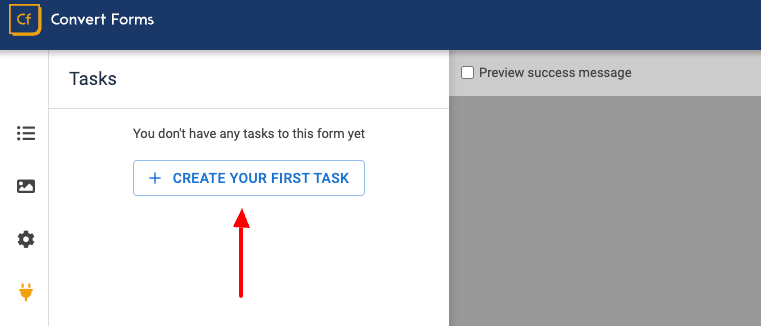
On the modal that will open, select the Kit task.
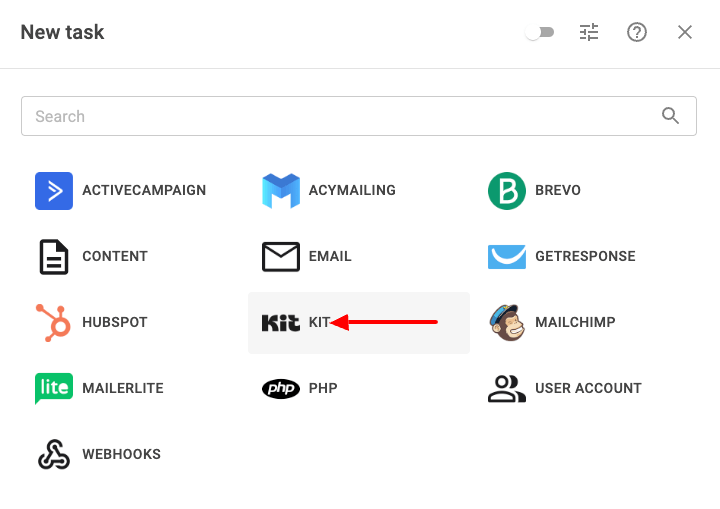
Select New Submission under Trigger and Add/Update Subscriber under Action on the next screen, and click CONTINUE.
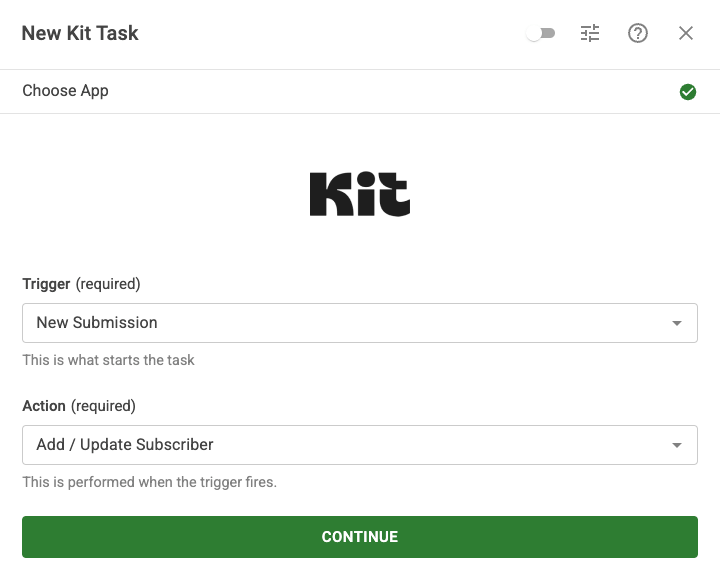
Create Connection
A connection is essential to connect to a 3rd-party service, such as Kit. Let's see how to create a new connection that will allow us to connect to Kit.
On the next step, click SIGN IN to create our Kit connection.
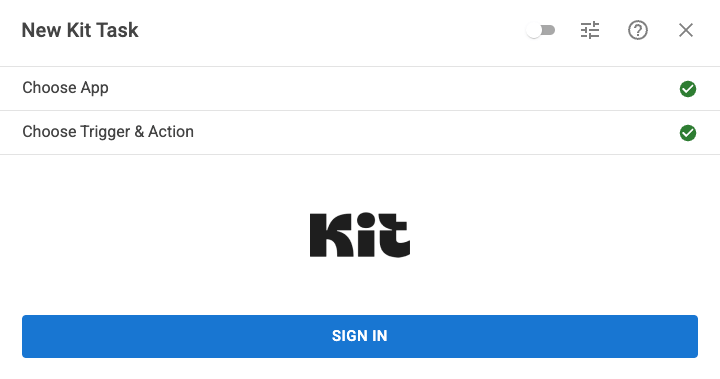
To create our connection with Kit, Click ADD CONNECTION to get started.

Get your Kit API Key
Before connecting to Kit, you need to grab your API Key by following the steps listed below:
Log into your Kit Account, click on your account name on the top right of the page, and click "Settings".
Next, click on the "Developers" tab on the left-hand sidebar.
To create your API Key, click on "Add a new key".
On the modal that appears, type a name for your API Key and click on "Create API Key".
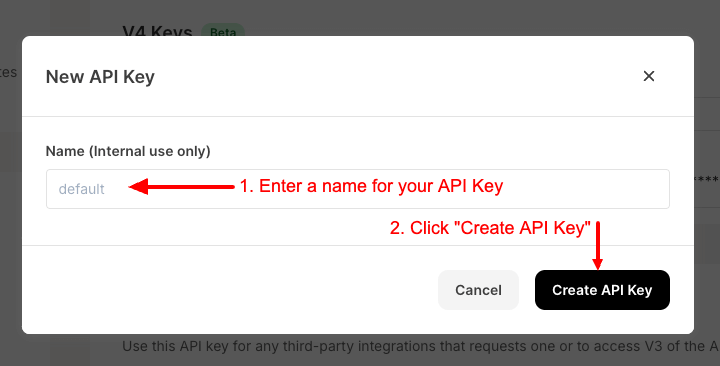
Your API Key is now available. Click on "Copy" to copy it to your clipboard and use it in the next steps. We suggest you store it somewhere safe as you won't be able to view it again.
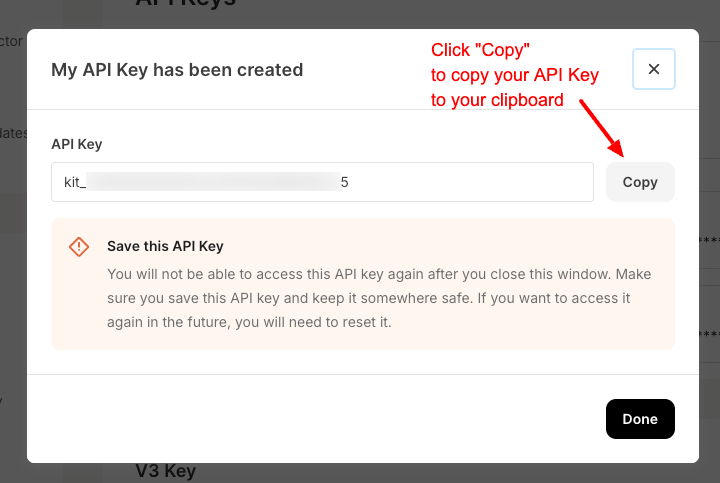
Now that we have obtained our Kit API Key, we can continue setting up the connection with Kit. Enter a connection name and paste your Kit API Key in the fields Connection Name, Kit API Key, respectively. Then click ADD CONNECTION.
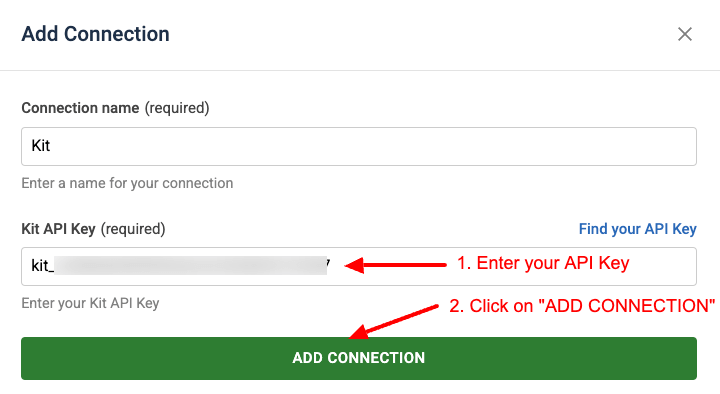
The connection has been added, and you can close the connections window.
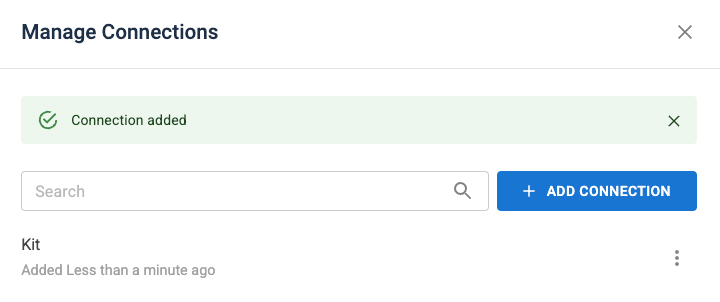
If you see the "Connection added" message, your connection with Kit has been established, and you can continue with the next step. If you see any error message, please review your API Key.
Select the newly created connection from the list and click CONTINUE.
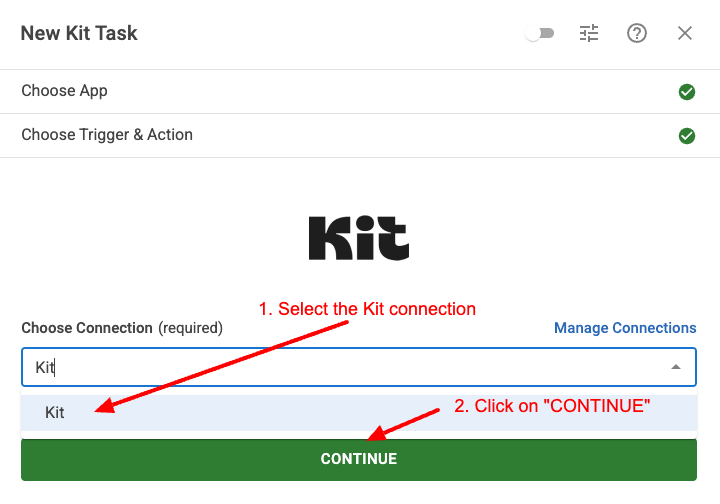
Ensure that your newly created Kit connection is selected in the dropdown.
Setup Action
After you've set up the trigger, action, and connection, it's time to set up the action itself and define what information to send to Kit. In this step, you can view all available settings and map each option with a fixed or dynamic value using Smart Tags.
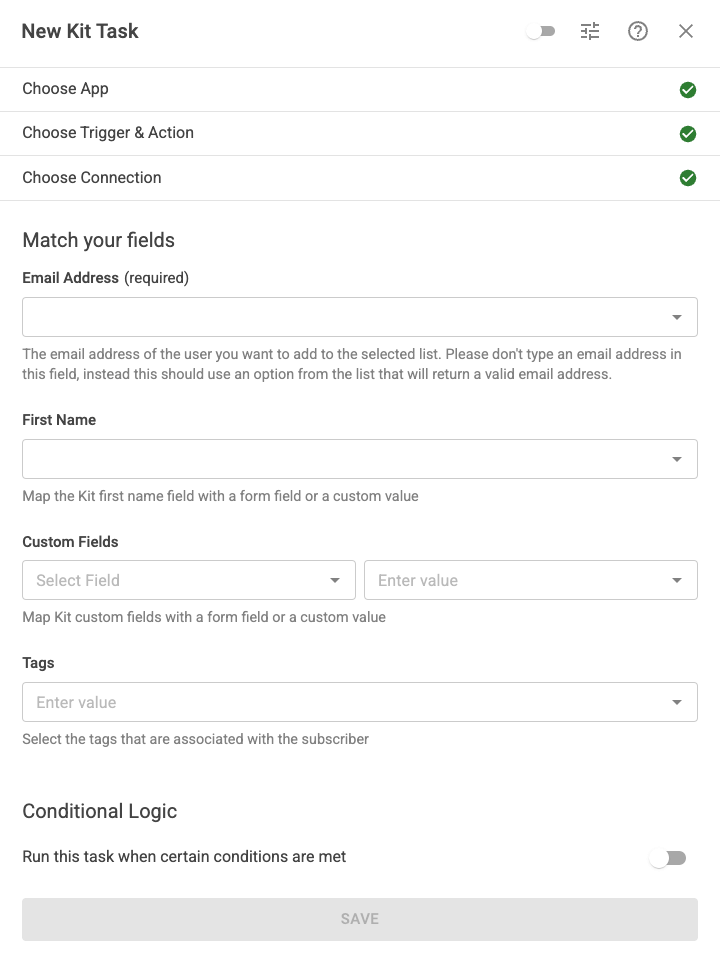
Let's see all available settings:
Email Address
Select the email address of the submitter. This is the user that will be subscribed to your Kit account. Choose the Email field in your form.
First Name
Select the first name of the submitter.
Custom Fields
Kit provides custom fields that helps you store additional information alongside the contact details, such as their age, contact information, and more!
Tags
Kit allows you to assign specific tags to your subscribers.
Add Conditional Logic
Conditional logic makes it possible to run tasks only if specific criteria are met, like a user’s email address matching a certain domain, the user being associated with a certain Joomla User Group, or a form submission having a specific value.
While editing the Kit task, go to the Setup Action step and scroll down to the Conditional Logic section to set up Conditional Logic. Here's where you define all the rules the task should meet to run.
For example, let's say we need to sync submissions to Kit, only if the email is coming from a specific domain: @domain.com.
- Click to enable the Run this task when certain conditions are met.
- Click Add Your First Condition.
- Select the Email field in the Trigger dropdown.
- Select Contains in the Operator dropdown.
- Enter @domain.com in the value. Replace this with your domain name.
The condition should look like this:
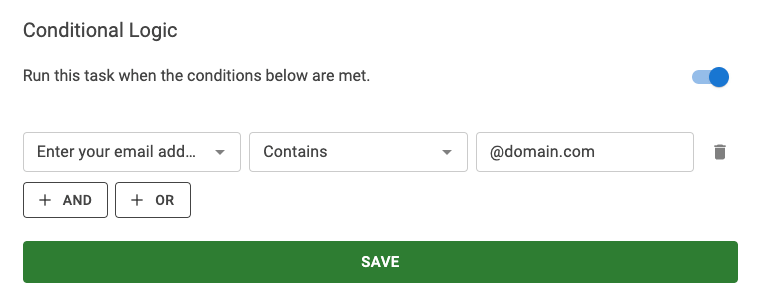
You can read more on Conditional Logic on the Working with Tasks documentation page.
Activate Task
The final step is to enable our task. To do so, click the toggle on the dialog’s top right corner, as shown in the screenshot below.

Finally, click Save to save the task, close the dialog, and then click Save from the top right corner of the form builder to save the changes on the form.
Congratulations! You’ve successfully created a form that syncs new submissions to Kit!
Setting Up Kit Campaign (Deprecated)
This method uses the soon-to-be deprecated Convert Forms Campaigns, which requires you to create an Kit campaign, configure it and assign it to your form. We suggest you use the new tasks way of integrating Kit with Convert Forms by clicking here.
To get started follow the steps below:
- Navigate to Components > Convert Forms > Addons
- Click the Cog button for the ConvertKit Addon. A popup will appear where you can enable the addon.
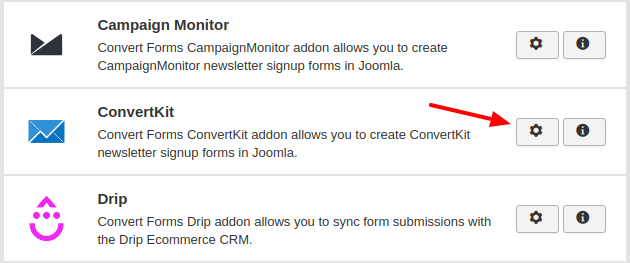
- Click on the Status and select Enabled.
- Now you can click on Save & Close button to save the enabled addon.
Campaign Setup
To setup a Campaign with ConvertKit, follow the steps below.
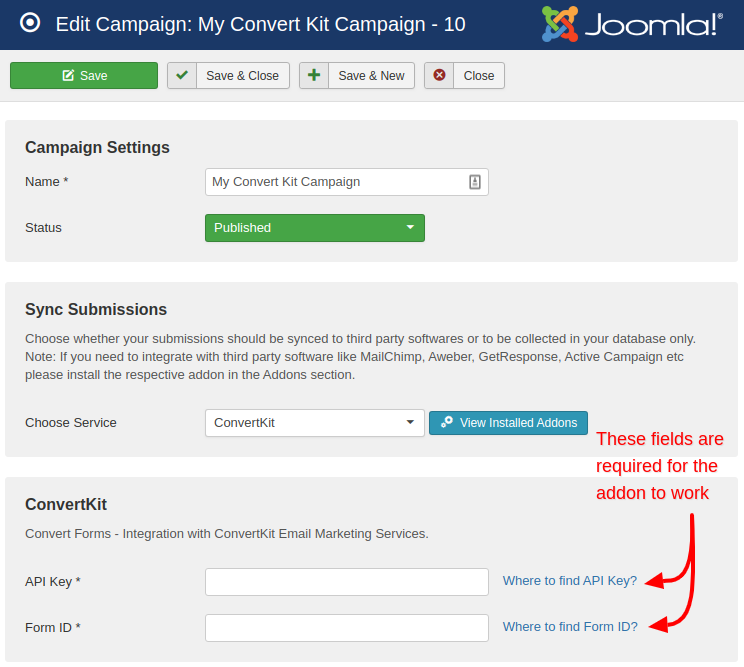
- Navigate to Components > Convert Forms > Campaigns
- Create a new Campaign by clicking New
- Type a name for your Campaign. This name can not be seen by anyone else but you.
- For the Sync Leads > Choose Service selectbox choose ConvertKit. If you can not find the ConvertKit option then you do not have the ConvertKit Addon installed and activated. In that case, please go back to the top of the article and see how to install the mandatory addon.
- Save the Campaign for the special ConvertKit fields to show up.
ConvertKit API Key
To obtain your ConvertKit API Key you need to log into your ConvertKit Account and click the "Account" option in your ConvertKit's account main menu. Once you are there, you will be able to copy the API Key as it is shown in the screenshot below.
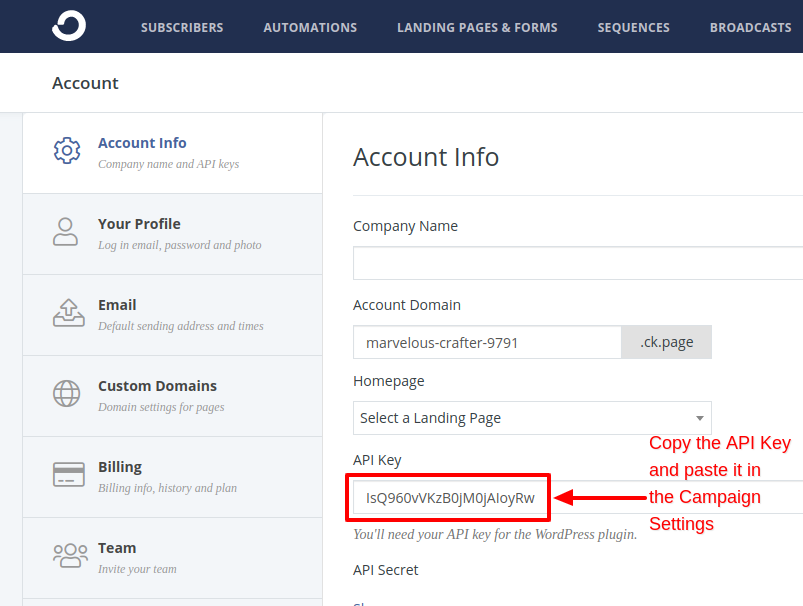
Now that you have the API Key, go ahead and paste it back into the Campaign settings you were setting up previously in Convert Forms.
ConvertKit Form ID
To obtain your ConvertKit Form ID you need to navigate to your Account's Forms. You can do that by clicking the "Forms" option in your ConvertKit account's main menu.
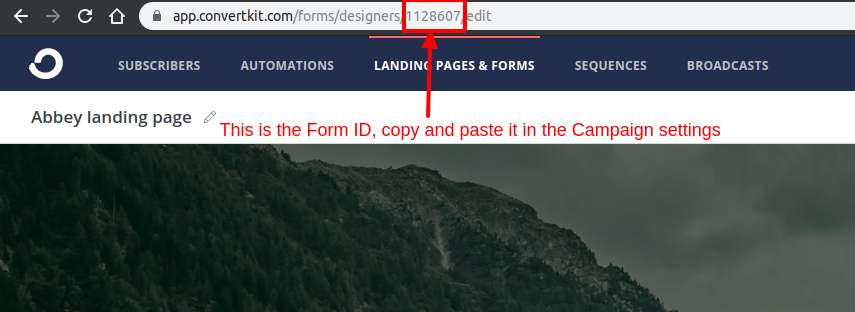
Once you are there, find the form you are interested in and click on it. While in the form's settings you can find the form ID as shown in the screenshot above. Now you can copy and paste the form ID into the Campaign settings exactly as you did previously with the API Key.
Finally, now that you have both prerequisite fields, you can Save & Close this Convert Forms Campaign.
Email & Name Fields
For a Convert Form to successfully store an email address to your ConvertKit account it needs to have an email field. This field is already set up at the time of creating the form and you don't have to change its input value as it is already configured for you.
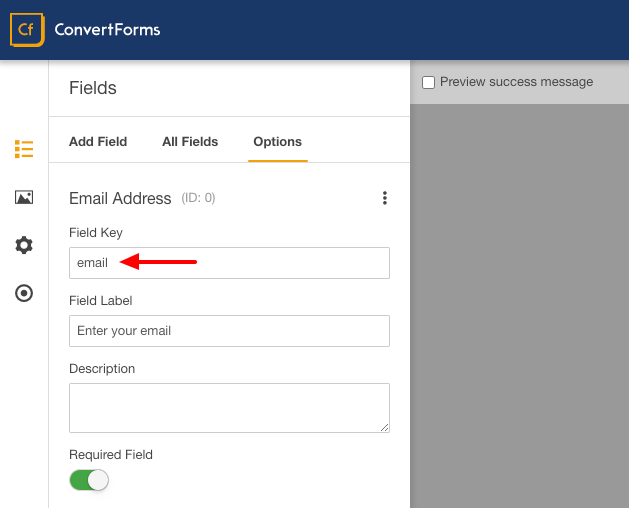
Name
ConvertKit offers by default one field specifically for the contact's first name. To use that field you should create a field named first_name. See the screenshot below to understand where to set it up.
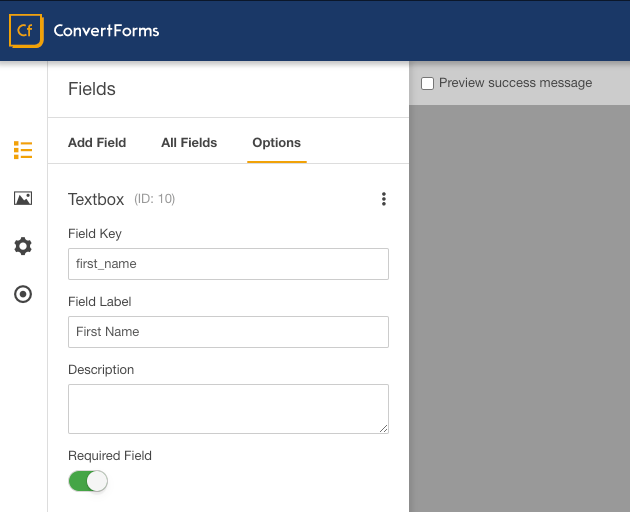
You can use this field as a fullname option as well but we recommend that you follow ConvertKit's architecture and instead use a custom field for a last name or even middle names. See next how to use ConvertKit's custom fields with Convert Forms.
Custom Fields
ConvertKit offers custom fields to collect more types of data for each of your contacts. We can also use these custom fields in a Convert Form for a more efficient data gathering and by extension, a more efficient campaign. Let's see how.
First you need to navigate to your ConvertKit Account, click "Subscribers" in your ConvertKit Account's main menu and select any existing contact or create a new one. As you can see in the screenshot below, we have created three custom fields as an example. Address, Age and Last Name.
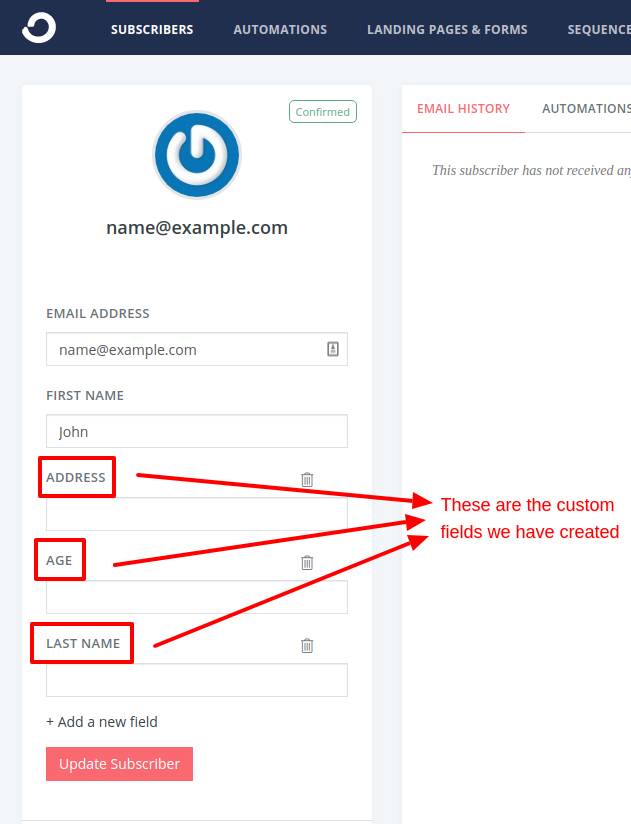
With the custom fields you have configured on your ConvertKit Account, you can now proceed and use the same ones in your Convert Form. For example, we used our Address and Age custom fields in our Convert Form in the screenshot below.
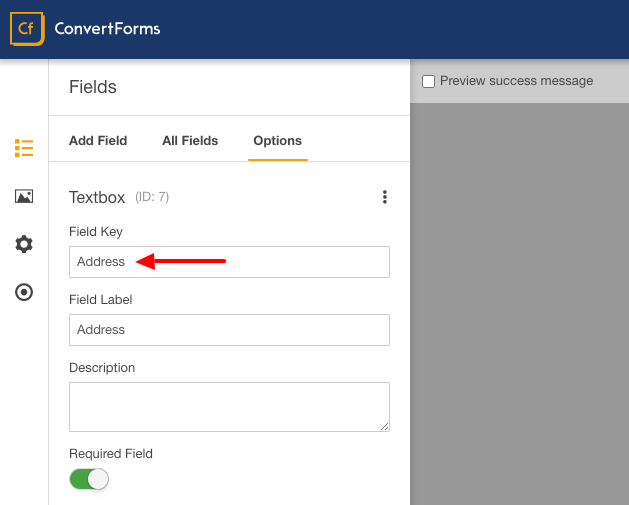
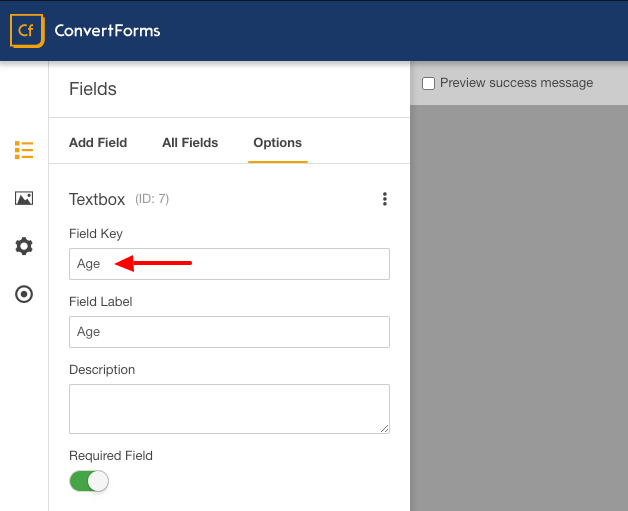
In case you create a custom field which has more than one words, in order for you to populate that field with Convert Forms you need add an underscore instead of a space. See how we setup the "Last Name" custom field in the screenshot below.
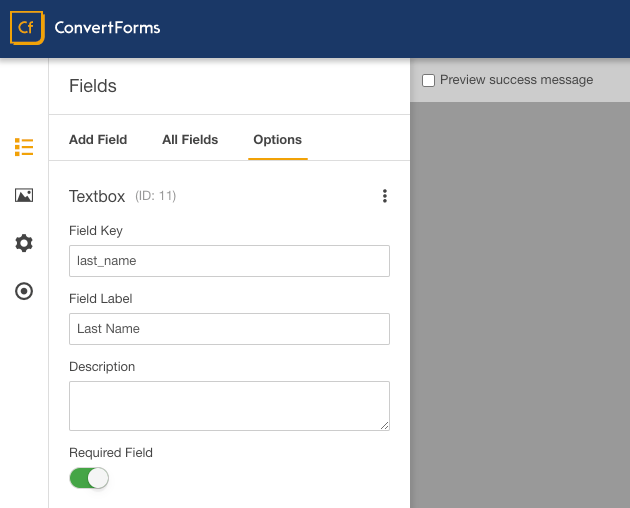
Tags
On top of custom fields, ConvertKit also offers the ability to tag your subscribers. To create tags you need to navigate to your ConvertKit Account's Subscribers and click on the "Create Tag" link in the sidebar. As you can see in the screenshot below we have created two tags for this example.
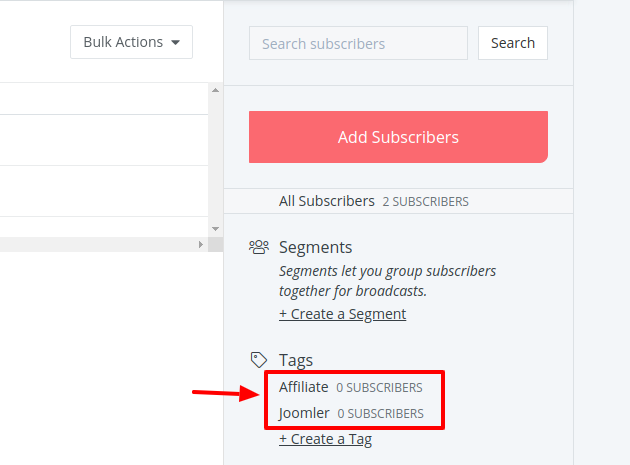
To use those tags in Convert Forms you need to create a hidden field and use one of those tags as a field value. If you want to use more than one tags then you need to add them as a comma separated list like in the screenshot below.
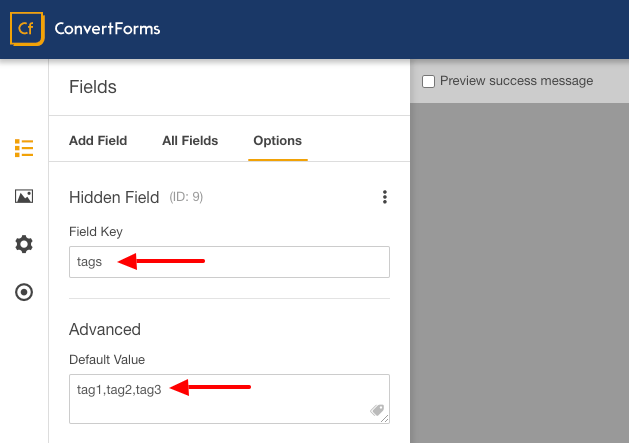
Assign form to Campaign
Of course don't forget to assign the form to our newly created Campaign! See the screenshot below to understand where to assign it.
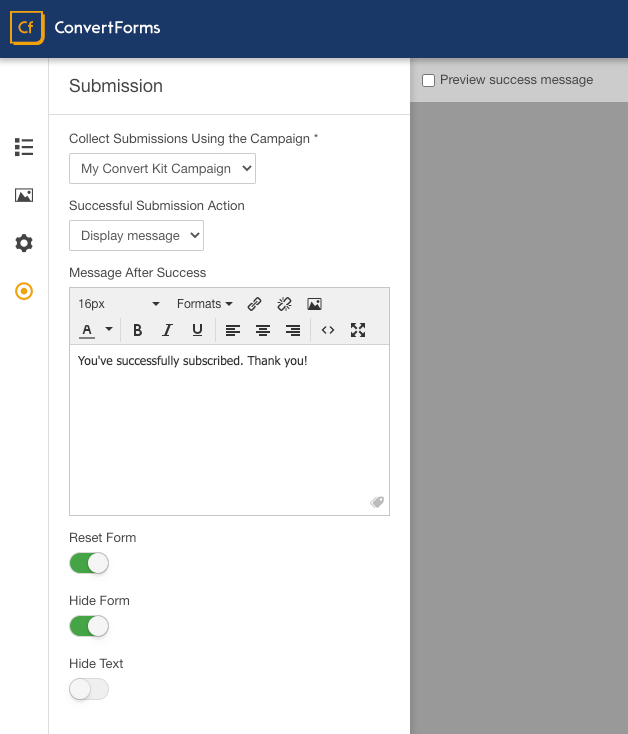

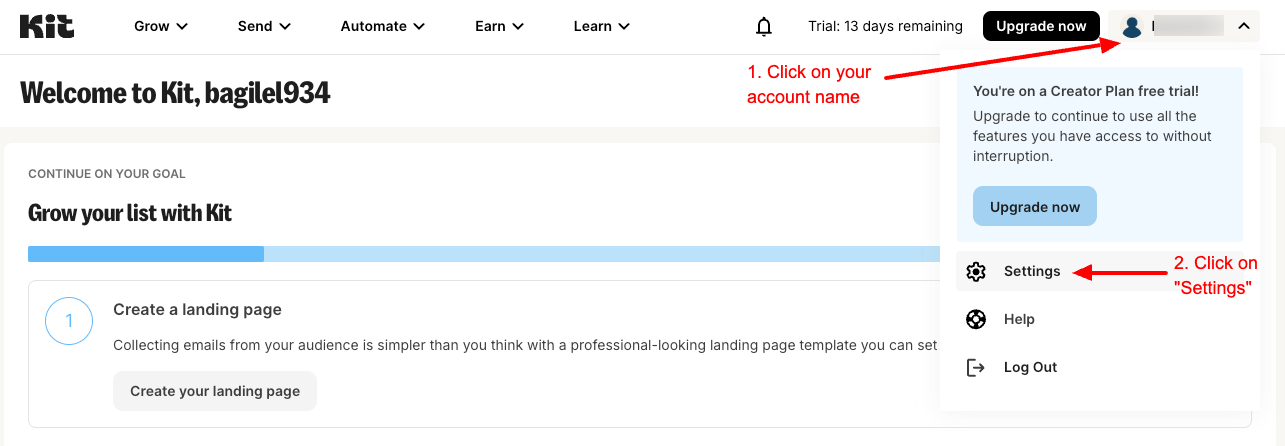
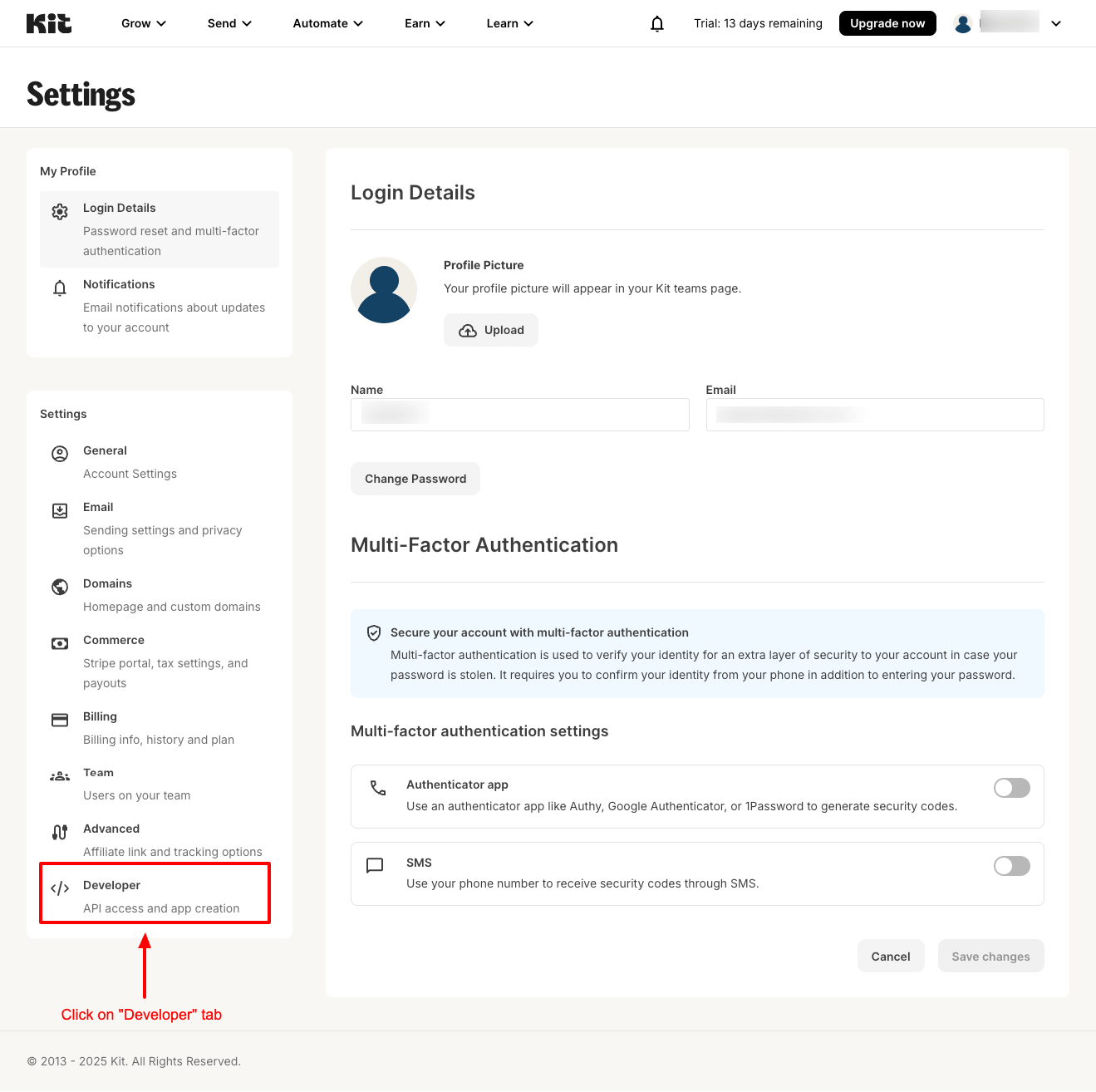
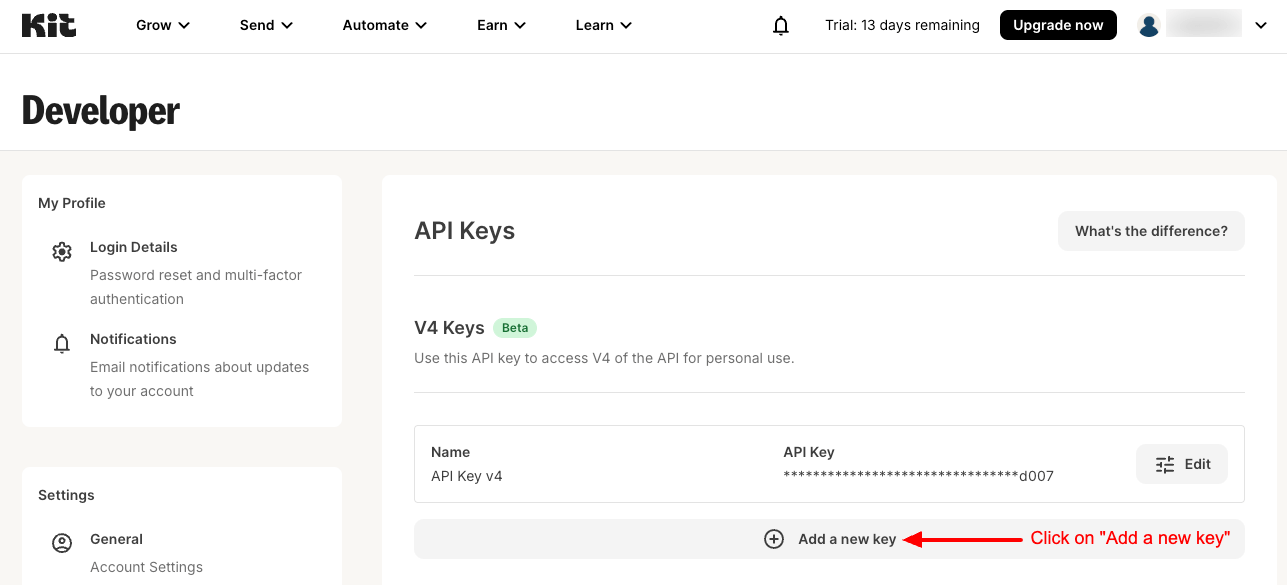





 Rated:
Rated: 